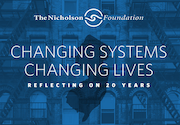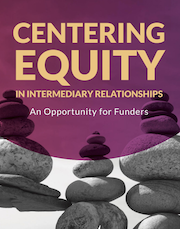Site Search
- resource provided by the Forum Network Knowledgebase.
Search Tip: Search with " " to find exact matches.
CNJG is pleased to offer this series of webinars to our members, hosted by our partners at the Center for Disaster Philanthropy.
With COVID-19 there seem to be more questions than answers, particularly for funders who want to respond effectively and efficiently. This series of seven webinars will bring expert panelists together to address some of the most pressing issues, including getting money out the door quickly, supporting vulnerable populations and managing other disasters in the midst of the pandemic.
Join the Center for Disaster Philanthropy for one or multiple webinars to gain a better perspective on the role of philanthropy in COVID-19 response and recovery.
Cost: Free for CNJG members and Nonmember Grantmakers
CNJG thanks the Center for Disaster Philanthropy for hosting this series.
Upcoming Webinars in this Series:
June 23: Managing a Global Response
July 14: How Funders Can Support Bereavement and Grief
Past Webinars in this Series:
April 14: Making Effective Rapid Response Grants
April 28: Managing Multiple Disasters Amid the Pandemic
May 12: Place-based Grantmakers and Investing in Local Communities
May 26: How Philanthropy Can Stand Up for Vulnerable Populations
The Council of New Jersey Grantmakers’ 2023 – 2027 Strategic Plan reimagines the future for CNJG. As a result of the extensive strategy development process, the plan includes a renewed vision, mission, core values, and goals. The work is informed by previous efforts, and current issues and trends impacting philanthropy and society.
The 2023 - 2027 Strategic Plan is a roadmap for the next five years, built upon CNJG's past strategic plans and learnings. We look forward to executing this plan, the additional learnings and opportunities it will bring, and delivering on these goals to move us into the future.
CNJG is helping track philanthropy’s response to the coronavirus pandemic by continuing our “Get on the Map” Campaign partnership with Candid who has launched a new coronavirus map in response to funders requests.
It is critical to be transparent and share this information with other funders to help inform your philanthropy in the coming weeks and months. The information gathered will be publicly available and updated daily at candid.org/coronavirus. Knowing where money is going and how, and having the latest information from organizations, facilitates thoughtful collaboration and decision-making in times of crisis.
You can see a list of grants meant to benefit New Jersey, or
A link to highlight grantmaking by funders in New Jersey.
You can also use different filters to, for example, see grantmaking by funders in Bergen County.
They are also working on making their response funds page filterable by geographic area served. A list of the current New Jersey response funds is available here.
As you can see from any of these “live” maps, the information they have collected is not complete, and this is where we need YOUR help!
Please visit our Share Your Giving Data webpage for information about how to share your data.
If you have any questions on how to submit your data, about the map, or how to include your response fund, please contact Craig Weinrich, CNJG’s Director of Member Services. Thank you in advance for your assistance in getting a more complete picture of New Jersey’s philanthropic response to COVID-19.
CNJG provides this information free to the philanthropic community. If you are not a CNJG member, please join so you can take full advantage of the many benefits of membership and help underwrite the cost of services like this.
Culture Workers often face inconsistent income and undervaluation of their work. Traditional budgeting models leave many without (or lack adequate support of) fair compensation using the belief that mission-motivation and passion for the work replaces the need for competitive salaries. The Solidarity Economy is an innovative and inclusive economic framework that prioritizes social justice, environmental sustainability, and community well-being. Join us for a compelling conversation about funding practices that use a solidarity-based approach and find out what New Jersey funders are learning about local compensation trends from the ArtsPay NJ report. Together we will explore ways to advocate and take action around worker pay equity and beyond.
Panelists:
John McEwen, Executive Director – New Jersey Theatre Alliance
Erica Nagel, Deputy Director – New Jersey Theatre Alliance
Eddie Torres, President & CEO – Grantmakers in the Arts
Moderator:
Diane Felcyn, Program Officer – New Jersey State Council on the Arts
Webinar Video
Resources
Solidarity Not Charity: Arts & Culture Grantmaking in the Solidarity Economy - Grantmakers in the Arts
Solidarity Economy Resources - Grantmakers in the Arts
Grants to Worker Cooperatives & Small Businesses — The Reader - Grantmakers in the Arts
Grantmakers’ Changes in Practice 2023 — The Reader - Grantmakers in the Arts
Support for Individual Artists’ Committee - Grantmakers in the Arts
ArtsPay NJ - New Jersey Theatre Alliance
ArtsPay NJ - Information, Reports, and Dashboard
ArtsPay NJ - Interactive Dashboard
ArtsPay NJ - Full Report
ArtsPay NJ - Summary Report
Webinars
Upcoming: Wednesday, October 23
Move the Money: Nuts & Bolts: Making Grants to Cooperatively Owned Small Businesses
Previous
Move the Money: Grantmakers in the Arts & Art.Coop Solidarity Economy Discussion Series
Move the Money Series: Guaranteed Income
Move the Money: The Richness of Southern Soils: Supporting Black Farming and Food
CNJG is tracking philanthropy’s response to the coronavirus pandemic by elevating our “Get on the Map” Campaign partnership with Candid (formerly Foundation Center). Candid recently launched their new coronavirus map, as a part of their coronavirus webpage. Now, we need your help to share funding efforts related to the coronavirus pandemic, so your COVID-19 grants can get on this new map. The more data that they can gather to complete the map, the more useful this resource will be for your organization.
Learn how you can share your data with Candid in this webinar as Kati Neiheisel, EReporting Liaison will walk us through the why and how of sharing data, and how sharing grants data informs the sector, locally, regionally, and globally. It is critical to be transparent and share this information with philanthropy in the coming weeks and months. Tracking this data will help coordinate and inform all of NJ Grantmakers' efforts for COVID-19 response and relief.
After this demonstration, we will hear from Linda Czipo, President and CEO at the Center for Non-Profits for an update on the results of the 2nd Rapid Response Coronavirus Nonprofit Survey conducted from April 3 to April 7. Linda will share information on nonprofits most urgent needs to better inform your grantmaking during this crisis. For results from the first survey, visit here.
Cost: Free for CNJG Members and NonMember Grantmakers
This program is only open to Grantmakers.
Webinar Video
In March 2024, Governor Murphy signed into law significant reforms to the ways that New Jersey enforces municipal affordable housing obligations under the state Supreme Court Mount Laurel doctrine. The new law creates enhanced affordable housing opportunities for New Jersey’s low-and moderate-income households, while seeking to streamline the affordable housing development process by setting clear guidelines for determining housing obligations. It is expected to reduce legal costs and judicial involvement. Join Adam Gordon, Executive Director and Emily Devenney, Grants and Development Manager of the Fair Share Housing Center for a conversation about what this new legislation means for philanthropy.
Since the revival and improved enforcement of the Mount Laurel Doctrine in 2015, New Jersey has seen a considerable increase in affordable housing production. However, there remains a substantial shortage of affordable homes in the state, particularly for very low-income residents. The legislation aims to address this gap by ensuring that every municipality contributes its fair share of affordable housing.
Key features of the legislation include a streamlined process for determining affordable housing obligations, codification of methodology for calculating these obligations, increased transparency in the housing development process, and the repeal of the state Council on Affordable Housing (COAH). Additionally, the legislation prohibits wealthy towns from avoiding their housing obligations through regional contribution agreements.
Cost: Free for CNJG Members; $50 for Non Member Grantmakers
Adam Gordon is the Executive Director of FSHC and leads FSHC’s coordinated strategy of organizing, litigation, and policy development to advance racial, economic, and social integration throughout New Jersey and the United States. Since joining the organization in 2006, he has worked to implement the Mount Laurel Doctrine which has created over 70,000 affordable homes in historically exclusionary NJ communities, litigated the largest federal fair housing case in American history, and worked to make federal disaster recovery policy more equitable. Under his leadership FSHC has secured the passage of the first statewide Fair Chance in Housing Act to limit discriminatory tenant screening policies and a landmark $305 million fund to accelerate affordable housing development. Gordon holds a B.A. and J.D. from Yale University.
Emily Devenney joined Fair Share Housing Center as the Grants & Development Manager in January 2024. She comes with experience in fundraising and community organizing, and strong connections to South Jersey, where she was born and raised (and likely will never leave). Emily has a B.A. in Economics and a Masters of Public Policy from the University of Massachusetts Amherst and a Certificate in Fundraising from Villanova University.
Webinar Video

For 20 years, The Nicholson Foundation worked to advance meaningful change in safety net service systems in New Jersey. Its grantmaking journey is described in Changing Systems, Changing Lives: Reflecting on 20 Years. Through stories and related text, the book showed how a small family foundation could take six guiding themes and put them into action through grants and partner support. In the process, the Foundation collaborated to spur real systems change that benefitted individuals, families, and communities. A recent scholarly paper built on that work, helping to make the Foundation’s approach broadly accessible to researchers, academics, and philanthropists. “A Framework for Creating Systems Change,” by Drs. William Brown and Wynn Rosser published in The Foundation Review, presents a new model for systems change. Five of the model’s seven components reflect themes in Changing Systems, Changing Lives. The sixth component slightly shifts the emphasis of the Foundation’s “Engaging with Government” theme, and the seventh highlights the Foundation’s overall approach by including performance measurement as a distinct and separate component of the model.
Download or order a free hard copy of The Nicholson Foundation book, "Changing Systems, Changing Lives"
Read Brown W, Rosser W. "A Framework for Creating Systems Change". The Foundation Review, 2023;15(4):50-6.

- The American Express Foundation diversified strategies to build non-profit management skills in its effort to develop diverse talents in the non-profit sector. Some of these efforts include a leadership development program that supports emerging talents from various ethnicities, generations and genders.
- The Baltimore Community Foundation took the first step to educate and inform the foundation internally before sharing its DEI efforts with the community. A shared understanding among internal stakeholders helped align their goals around DEI which made integrating DEI work in the foundation and the community much more effective.
- Access Strategies Fund increased civic participation of diverse communities through equitable grantmaking driven by diverse decision makers and saw dramatic increases in political representation among communities of color.
- The Silicon Valley Community Foundation believes that data can drive equity and publishes data on its website regarding the gender and racial / ethnic diversity of its staff and leadership, and lists the grants it provides to organizations or programs serving ethnically diverse populations.
